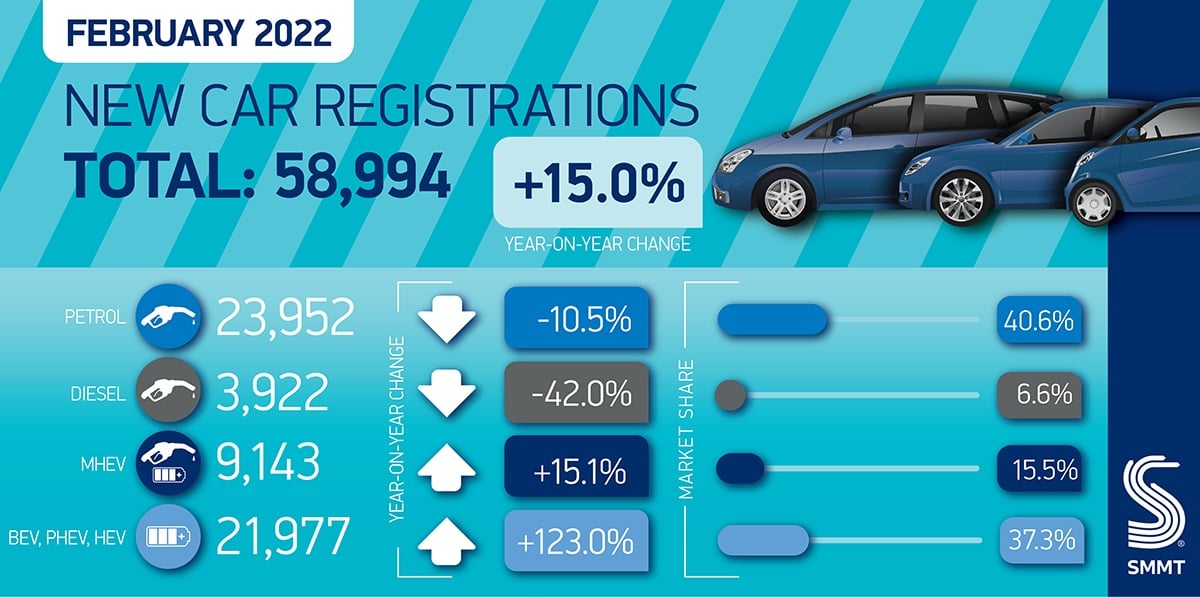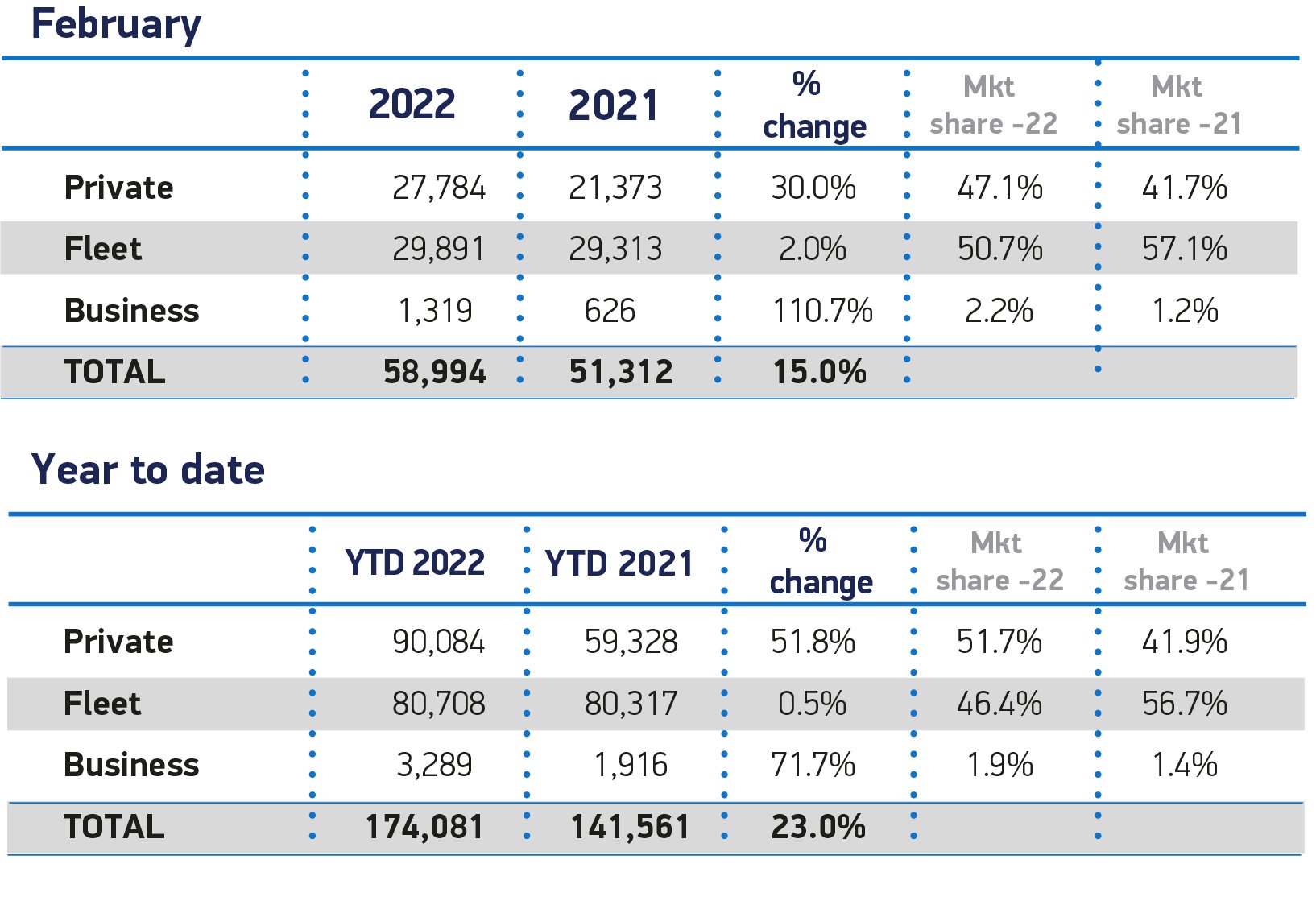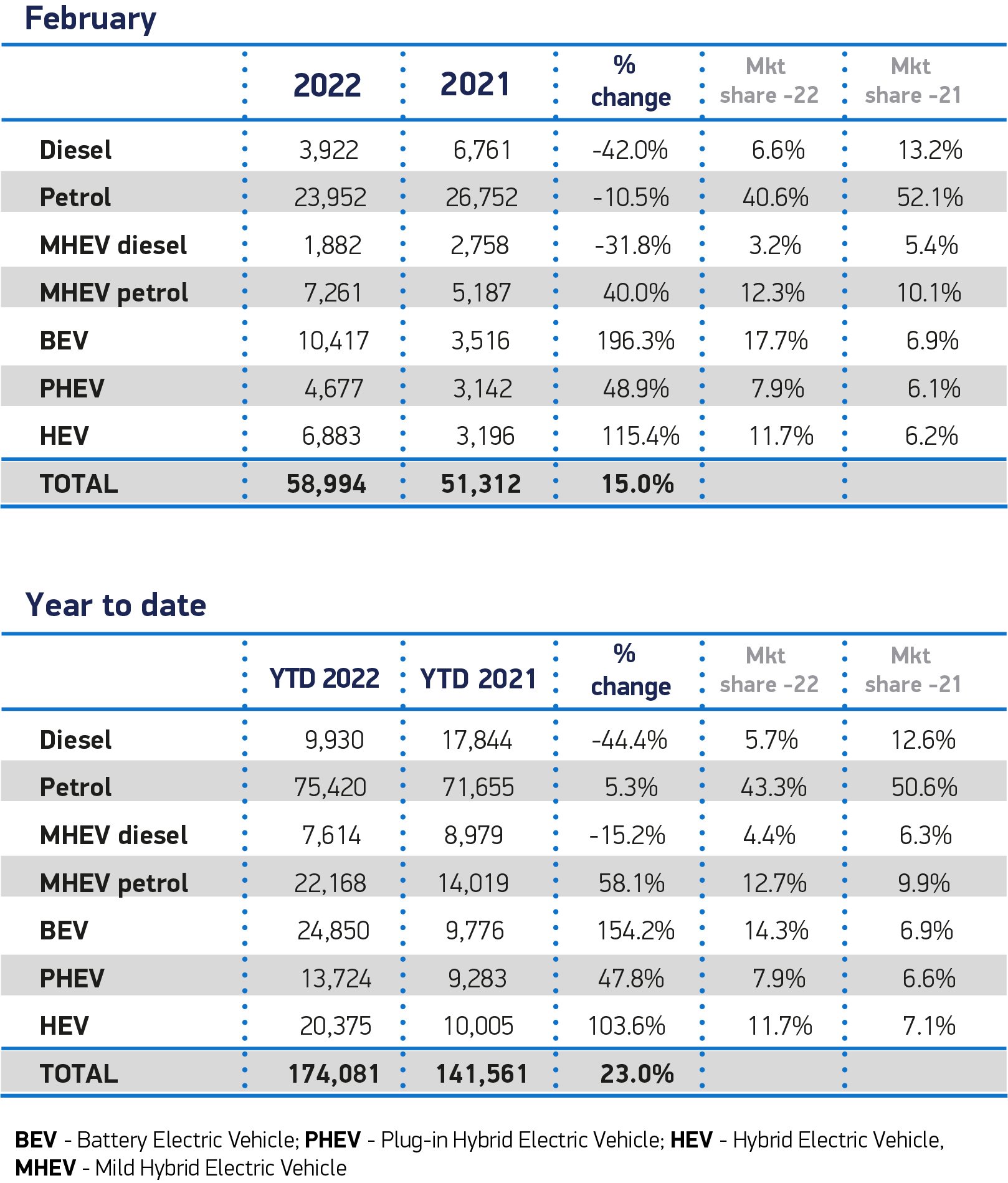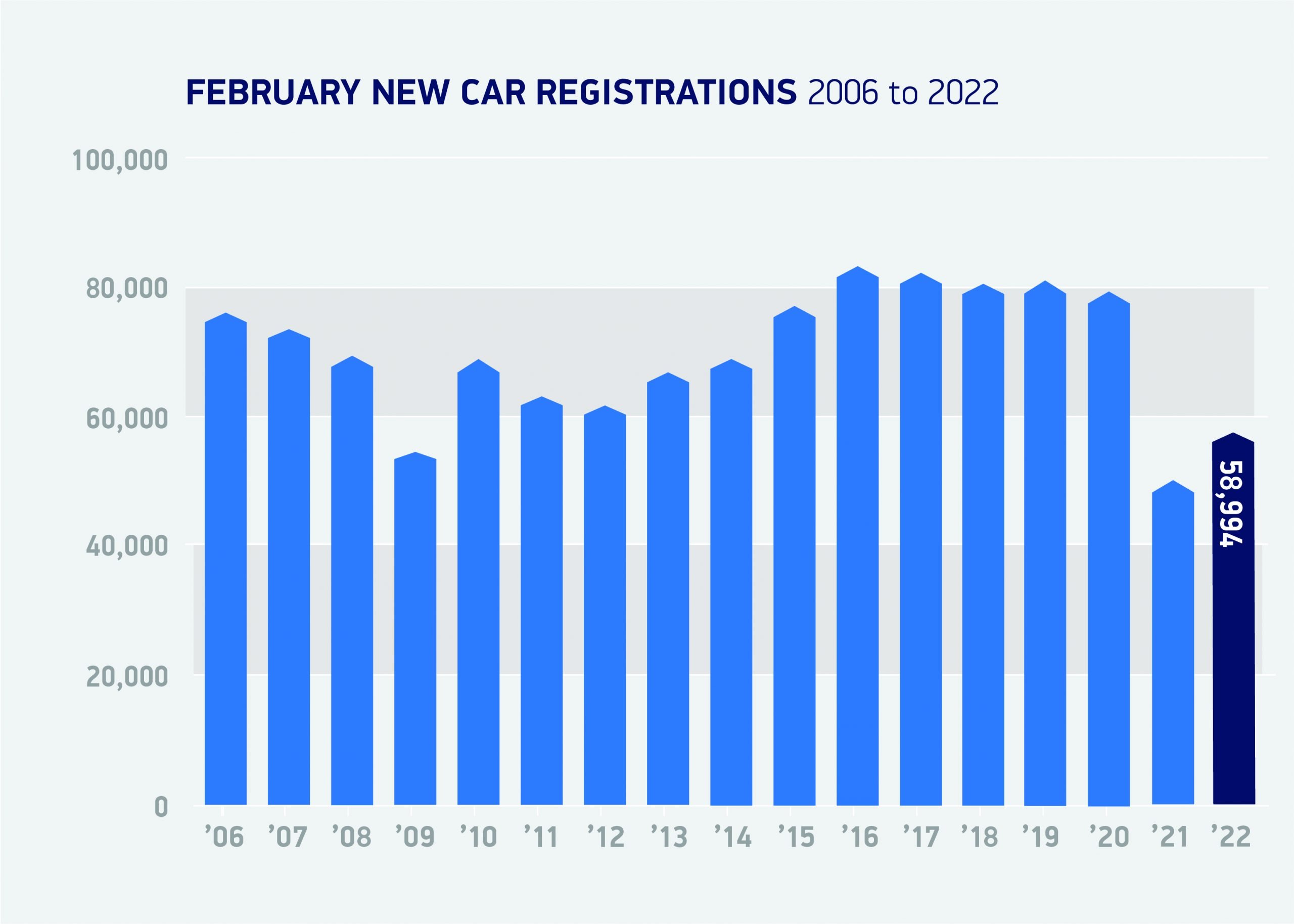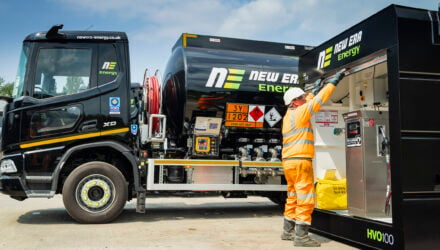UK new car registrations rose by 15.0% in February as 58,994 new cars joined Britain’s roads, according to the latest figures from the Society of Motor Manufacturers and Traders (SMMT). The rise of 7,682 units was in comparison with the same month in 2021, when the pandemic shut car showrooms across the UK. Despite this positive performance, registrations are down -25.9% on pre-pandemic levels, as vehicle supply remains constrained by semiconductor shortages.1
Compared with February 2021, when showrooms were closed and only ‘click and collect’ permitted, private registrations rose by 30.0%. Large fleet registrations remained stable, up just 2.0%, indicating that in a supply-constrained market, manufacturers are also prioritising private customers, which accounted for more than 80% of growth. While business purchases grew by 110.7%, this equates to a rise of just 693 units.
It was another bumper month for battery electric vehicles (BEVs), however, which took a 17.7% market share to reach 10,417 units, while registrations of plug-in hybrids (PHEVs) rose to 4,677 units and a 7.9% share of the market. When combined with hybrid (HEV) registrations (6,883), electrified vehicles accounted for more than a third of all new cars leaving dealerships. While this demonstrates the growing demand for electric cars, February is typically the lowest volume month, as many buyers delay purchases until the ‘new plate’ month of March, and fluctuations in supply for some key models can have a more pronounced effect in terms of market share.
Of greater concern to the long term delivery of net zero road transport, however, is the need for accelerated public chargepoint provision. Investments are being made, but at a pace that continues to lag behind plug-in vehicle uptake. Last month, the industry published its seven-point plan to increase the number of public on-street chargers ahead of need.2
Meanwhile, April will see the effective end of the Electric Vehicle Homecharge Scheme (EVHS), which has provided vital funding for homeowners to install their own chargepoint. Ahead of the government’s Spring Statement, SMMT is calling for an extension to both the EVHS and its business counterpart, the Workplace Charging Scheme, beyond 2025 to ensure EV uptake remains on track to meet Government’s net zero deadlines. It also recommends that VAT on electricity used for public charging points be cut to match that for home use, so that EV drivers are treated equally regardless of where they charge their vehicle.
Mike Hawes, SMMT Chief Executive, said, “Despite February’s traditional low registration numbers, consumers are switching to EVs in ever-increasing numbers. More than ever, infrastructure investment needs to accelerate to match this growth. Government must use its upcoming Spring Statement to enable this transition, continuing support for home and workplace charging, boosting public chargepoint rollout to tackle charging anxiety and, given the massive increase in energy prices, reducing VAT on public charging points. This will energise both consumer and business confidence and accelerate our switch to zero emission mobility.”
Jon Lawes, Managing Director, Novuna Vehicle Solutions: “Supply chain pressures continue to hamper new car production with some manufacturers reporting average wait times of up to 22 weeks, meaning we’re unlikely to see a wave of new plates hit the roads in the coming weeks. This is having a knock-on effect on service, maintenance and repair (SMR) budgets and heightens the importance for fleets of having reliable price protection in place from their leasing provider.
“Almost one in four new car registrations in the UK is now an electric vehicle (EV), rising to half if you include hybrid vehicles. As pump prices continue to soar to unprecedented levels, the savings electric vehicle drivers can achieve are becoming ever more stark and compelling, meaning motorists will increasingly turn their backs on petrol and diesel cars in favour of EVs.”
Meryem Brassington, electrification propositions lead at Lex Autolease said: “After a record-breaking year for zero-emission vehicles, there appears to be no signs of the market slowing down, with EVs now accounting for 15.5% of all new motors bought in the UK. Coupled with several manufacturers planning the release of new electrified models this year, the outlook for EVs looks exceptionally bright.
“Despite the ongoing turbulence across the industry continuing to impact the supply of new vehicles, tentative green shoots of recovery are starting to appear within the supply chain and it’s possible that we will see some of the pent-up demand released in the months ahead.
“Yet, if we don’t see continued investment in the roll out of publicly available charge points then ultimately the UK won’t be able to meet the demand for an electrified future. All eyes will be on the Chancellor this month for clarity and additional incentives for both fleets and private drivers to accelerate the electric revolution.”
Leon Wong, EV Business Development Manager at The Pilot Group, said: “Month on month, motorists are increasingly choosing low-carbon vehicles over ICE alternatives, and it’s essential that government and industry work together to maintain this momentum and satisfy demand.
“Key to this will be addressing common barriers to adoption, like the availability and equality of charging infrastructure. So, it’s encouraging to see that changes to the Electric Vehicle Homecharge Scheme (EVHS) – coming into effect from next month – will mean greater support for landlords, social housing providers and people living in apartment blocks.
“Financial stimulus remains a clear driver for individuals and businesses making the switch to electric, and must remain a priority for policymakers as the UK looks to achieve its Road to Zero targets.”
Lucy Simpson, Head of EV Propositions British Gas, said: “Despite the headwinds of material shortages and supply chain disruption, it’s encouraging to see EVs continue to drive growth across the new car market – another positive step as the UK accelerates along the Road to Zero.
“In order to stay ahead of the electrification curve, we must continue to respond to the charging challenges to avoid the millions of people without private driveways being excluded from EV ownership. It’s clear that there are regional disparities in public charging availability and this need to be addressed. Attention will turn to the Chancellor’s Statement later this month for further clarity on any additional incentives to support the UK’s electrification journey.”
Jamie Hamilton, automotive director and head of electric vehicles at Deloitte, said: “New car sales in February grew by 15% compared with February 2021, when sales were dented by showroom closures as a result of COVID-19 restrictions. Whilst this means a year-on year comparison does not reflect the true performance of the sector, sales also remain well below pre-pandemic averages in what is traditionally a weak month for new vehicle purchases.
Booming used car market
“Despite the current cost of living squeeze, consumer demand does not appear to be showing significant let-up. However, with new car sales hampered by a shortage of semi-conductors – compromising both inventories and order fulfilment – the used car market is booming. The average cost of a second hand vehicle is now reported to be more than £20,000, with some ‘nearly new’ stock selling for more than its brand new price as dealers attempt to keep up with demand.
’22 plate incoming
“Manufacturers and dealers will barely have time to reflect on February’s performance as all eyes turn to March. The release of a new plate means that March is, traditionally, the most important month for new car sales and can account for as many as one in five annual registrations. However, the ability for manufacturers to fulfil ’22 plate orders will likely be compromised by the ongoing semi-conductor shortage.
Rising fuel prices drive consumers towards electric
“The EV sector continued to break new ground in February. Battery electric (BEV) and plug-in hybrid electric (PHEV) vehicles grew by 196% and 49% respectively in February, and now hold a combined 25% share of the market. This compares to 13% in the same period last year.
“There is no sign of EV sales slowing down and, with both petrol and diesel tipping past £1.50 per litre in recent weeks, some consumers will likely be considering the savings they could be making by switching to electric sooner rather than later.”
1 February 2020 registrations: 79,594
2 https://www.smmt.co.uk/2022/02/uk-automotive-calls-for-ev-chargepoint-mandate-governed-by-independent-regulator-to-level-up-network-for-consumers/


